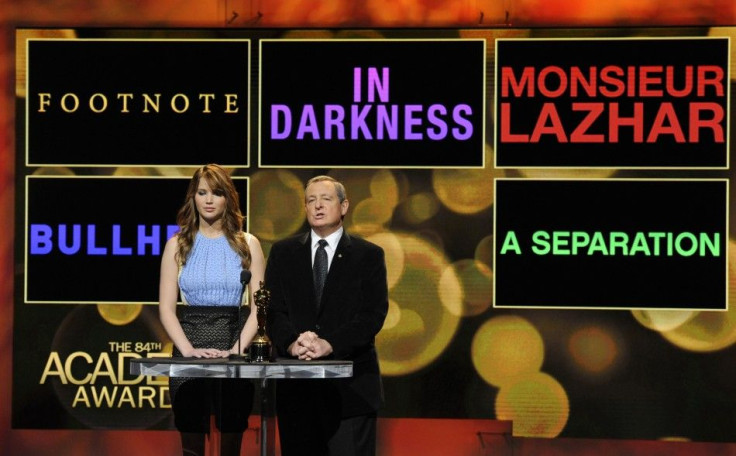Oscar Nominations 2012: Meet the Best Foreign Language Films [TRAILERS]

While the 2012 Academy Award nominations for Best Picture have left some confused and others shouting misogyny, the Israeli director Joseph Cedar called it “a great year for foreign film at the Oscar.”
Cedar, whose film Footnote earned him his second Best Foreign Language film nomination, is part of the list of five foreign filmmakers all vying for the prize.
None of the historic top 15 performers in the category were nominated this year, and the only country in the running to have won an Oscar in the past is Canada, which has been nominated five times overall and won in 2003 for The Barbarian Invasions. Among the 2012 contenders, Israel has had the most total nominations with 10, but has never won.
Bullhead (Belgium)
The debut feature from writer/director Michael R. Roskam is a dark crime thriller that deal with the cattle mafia and hormone dealing.
[Bullhead] was written so it could be appreciated all over the world, even if the theme of the cattle mafia is extremely Belgian,” producer Bart Van Langendonck told The Associated Press.
The movie has been making its way around the international festival scene and has already won awards, a distribution deal and rave reviews at events like the Austin Fantastic Fest and the Motovun Film Festival in Croatia.
Footnote (Israel)
The film is about a rivalry: a rivalry between two Talmudic scholars who also happen to be father and son. Both have have dedicated their lives to their work and become adversaries when the balance of power shift within their department of the Hebrew University of Jerusalem.
'Footnote' is the story of insane competition, the admiration and envy for a role model, bringing father and son to a final, bitter confrontation, Cedar, who was nominated in the same category in 2007 for his film Beaufort, explained.
It is the smallest department in the university, but it is famous worldwide for its uncompromising methods, and its unforgiving attitude toward the notion of 'mistake.' Once I started hearing stories from within this department, about mythological rivalries between scholars, stubbornness on an epic scale, eccentric professors who live with an academic mission that is bigger than life itself, even if its topic is radically esoteric, I fell in love with them all, and they became the center of this story.
Lior Ashkenazi, who plays the son, called the subject matter the most drab thing that could be,” but the Academy and critics seem to disagree. Footnote cleaned up in Israel's biggest film awards and won the Best Screenplay Award at the 2011 Cannes Film Festival.
In Darkness - Poland
In Darkness is based on the true story of Polish criminal Leopold Socha, who hid Jews from the Nazis during World War II. The film takes place in the town of Lviv, which had the third-largest Jewish population in Poland before the war and was the site of two SS-led massacres. Some 5,000 Jews were killed during the Lviv pogroms and more than 100,000 others were sent to ghettos and concentration camps.
The nomination is the third for director Agnieszka Holland, who was nominated for “Europa Europa” and “Angry Harvest,” both set during the Holocaust.
Monsieur Lazhar (Canada)
True, Canadian isn't a foreign language, but Philippe Falardeau's Monsieur Lazhar is actually a French-language film about an Algerian immigrant who moves to Montreal and becomes a teacher.
Adapted from the one-man play by Evelyne de la Cheneliere, the film has themes that echo internationally. The character Monsieur Lazhar's family was murdered in an arson attack because of his wife's critical book about Algerian society, which is still a pertinent topic in both Algeria and France. Also, the teacher is at constant risk of deportation, which will resonate with American audiences in places like Arizona and Alabama. And the cultural gap between the students and their foreign teacher is something that all immigrants entering a new land must deal with.
A Separation (Iran)
This Iranian film achieved what few Foreign Language nominees have: it was nominated in a second category. Writer Asghar Farhadi was also nominated this year for Best Adapted Screenplay, an award normally reserved for domestic films.
For a long time I had this picture carved inside my head, Farhadi explained in a statement. I don't know how it got there, but once it was there I just knew I had to make this film and here we are today with not one but two nominations.
As the winner of the Golden Globe, A Separation is the frontrunner in the category. The film is about a couple in an failing marriage who have to decide if they should stay in Iran with their family or leave the country for the sake of their young child. It has been called an intense, focused and narrative-driven film that has universal themes unraveling in a uniquely foreign setting.
A Separation also won the Golden Bear at the Berlin Film Festival in February 2011. It is currently playing in theaters around the United States.
Cedar was right in saying that the 2011 was a great year for foreign films and whichever one wins will be deserving. While Hollywood may be stuck in its white male past, the rest of the world is pushing itself in all directions and exploring the vast and border-less cinematic landscape.
© Copyright IBTimes 2024. All rights reserved.











